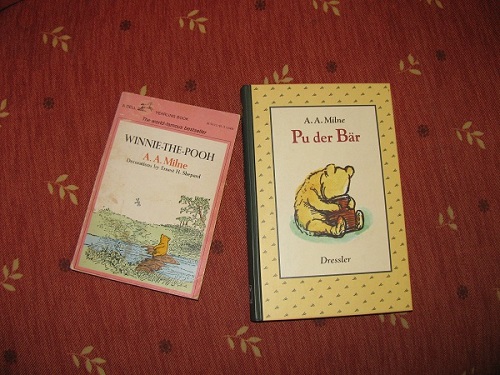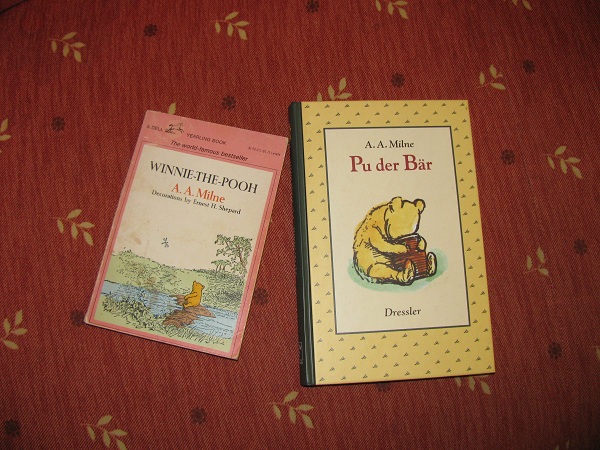Sonderling Sunday – Eeyore Has a Birthday
 It’s time for Sonderling Sunday! That time of the week when I play with language by looking at the German translation of children’s books.
It’s time for Sonderling Sunday! That time of the week when I play with language by looking at the German translation of children’s books.
Today I’m taking on the wonderful classic Winnie-the-Pooh, which I’m afraid isn’t quite as charming as Pu der Bär, but the translator, Harry Rowohlt, makes a good effort. Of course, all the nouns are Already Capitalized in German, so they can’t use capitalization With Great Meaning.
Last time I covered Pu der Bär was *gasp* 2016! We covered the chapter where Pooh meets the Heffalump. This means that today we’re on Chapter 6, “In Which Eeyore Has a Birthday and Gets Two Presents,” which when translated is Kapitel 6, In welchem I-Ah Geburtstag hat und zwei Geschenke bekommt.
I like including the first sentence. This one’s actually shorter in German!
“Eeyore, the old grey Donkey, stood by the side of the stream, and looked at himself in the water.”
= I-Ah, der alte graue Esel, stand am Bach und betrachtete sich im Wasser.
“Pathetic”
= Ein Bild des Jammers
(“A picture of misery”)
Shorter again in German:
“There was a crackling noise in the bracken behind him”
= Es raschelte im Farn hinter ihm
(“It rustled in the ferns behind him”)
“gloomily” = düster
“Which I doubt.” = Was ich bezweifle.
“Gaiety” = Frohsinn
“Here we go round the mulberry bush”
= Ringel Ringel Rosen. Darf ich bitten, mein Fräulein.
“riddle” = Rätsel
Sorry, just not the same:
“a Bear of Very Little Brain”
= ein Bär von sehr geringem Verstand
(“a bear of very low understanding”)
Okay, this had to have been a Great Big Challenge to translate:
“Cottleston, Cottleston, Cottleston Pie,
A fly can’t bird, but a bird can fly.
Ask me a riddle and I reply:
Cottleston, Cottleston, Cottleston Pie.”
The German version:
Fragen, Fragen, immer nur Fragen.
Es kann der Käfer den Specht nicht ertragen.
Gib mir ein Rätsel auf; ich werde sagen:
»Da musst du jemand anders fragen.«
It rhymes!
(Put through Google translate:
“Questions, questions, always just questions.
The beetle cannot bear the woodpecker.
Give me a riddle; I would say:
»You’ll have to ask someone else.«”)
“verse” = Strophe
zweite Strophe:
“Cottleston, Cottleston, Cottleston Pie,
A fish can’t whistle and neither can I.
Ask me a riddle and I reply:
Cottleston, Cottleston, Cottleston Pie.”
Auf Deutsch:
Fragen, Fragen, immer nur Fragen.
Ein Fisch kann nicht pfeifen und ich kann nicht klagen.
Gib mir ein Rätsel auf; ich werde sagen:
»Da musst du jemand anders fragen.«
(The new line through Google translate is:
“A fish can’t whistle and I can’t complain.”)
And finally, the third stanza:
“Cottleston, Cottleston, Cottleston Pie,
Why does a chicken, I don’t know why.
Ask me a riddle and I reply:
Cottleston, Cottleston, Cottleston Pie.”
Auf Deutsch:
Fragen, Fragen, immer nur Fragen.
Unsichtbar wird der Honig im Magen.
Gib mir ein Rätsel auf; ich werde sagen:
»Da musst du jemand anders fragen.«
(“Invisible becomes the honey in the stomach.”)
Hey, it rhymes!
“Many happy returns of the day”
= Herzliche Glückwünsche zum Geburstag
“proper” = angemessenes
We’ve done this before, but have to include:
“Piglet” = Ferkel
“knocker” = Türklopfer
“kindly” = liebenswürdig
“Very Sad Condition” = sehr traurig Zustand
“wants to cheer him up” = zur Aufheiterung wünscht
And a good sentence to know:
“Nobody can be uncheered with a balloon.”
= Niemand kann mit einem Ballon unaufgeheitert bleiben.
(“Noone can with a balloon uncheered remain.”)
“trotted” = trabte
“jar of honey” = Honigtopf
“tip of his nose” = seiner Nasenspitze
“trickled” = tröpfelte
Another phrase we Need to Know:
“Time for a little something.”
= Zeit für eine Kleinigkeit.
“as he took his last lick of the inside of the jar”
= als er den Topf ein letztes Mal ausschleckte
“useful pot” = nützlichen Topf
“paw” = Pfote
“wobbly” = wacklig
“admiringly” = bewundernd
“carelessly” = leichthin (“lightly”)
“rabbit hole” = Kaninchenloch
“blown up” = in die Luft geflogen (“in the air flown”)
“BANG!” = PENG!
“bang” = Knall
“with great difficulty” = unter großen Schweirigkeiten
“I burst the balloon!”
= ich habe den Ballon kaputtgemacht!
“snuffling” = schniefend
“And it’s for putting things in.”
= Und man kann Sachen hineintun.
“So it does!” = Es klappt ja! (“It works!”)
“It goes in!” = Es passt hinein! (“It fits in!”)
“as happy as could be” = so glücklich, wie man nur sein kann
“box of paints” = Malkasten
And the last sentence of the chapter:
“‘Yes, I remember,’ said Christopher Robin.
»Ja, jetzt weiß ich es wieder«, sagte Christopher Robin.
So, that took a while, but I like doing a complete chapter. May your next week be so glücklich, wie man nur sein kann!



